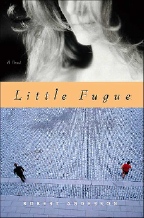Little Fugue
Robert Anderson
Ballantine Books, Random House
US Hardback
0-345-45410-3
367 pages; $24.95
Publication date: December 28 2004
Date reviewed: 2/2/05
Reviewed by: Stephanie Cage © 2004

REFERENCES
COLUMNS
|
|
|
Little FugueRobert AndersonBallantine Books, Random HouseUS Hardback0-345-45410-3367 pages; $24.95Publication date: December 28 2004Date reviewed: 2/2/05Reviewed by: Stephanie Cage © 2004 |
|
|
REFERENCES |
COLUMNS |
It's a good thing the cover of 'Little Fugue' states that it's a novel, because without that reassurance the reader might be left in doubt. 'Little Fugue' is so many things: biography, autobiography, poem and picture of our times. This is a book shot through with art of all kinds: it takes its title from a musical form, and like that form it weaves together a number of threads, flitting from one to another in a way that appears random but finally ties together into a dramatic, complicated climax.
At a surface level, it's about Robert (the author, or his alter ego), his real-life relationship with a beautiful but distant female photographer, Sabbath, and his poetic relationship with Sylvia Plath. Then there are large chunks of the book which recount in vividly imagined detail the lives of that fated triangle: Sylvia Plath, Ted Hughes, and Assia Gutmann Wevill. As if this was not already a wide enough scope, Robert's story also takes in major events of twentieth century history, from the 1968 student riots to the horrors of September 11th.
Anderson has set himself a huge remit and at times he struggles to pull together his many subjects into a coherent picture - or perhaps that is the point. There is no single picture, no one way of looking at the world. After all, the first picture we are given of Sylvia is as a woman shaped by her post-pregnancy diet into an impossibly angular piece of modern art: "She parsed herself into something shingled, something cubistic. Something with edges." Whether intentionally or otherwise, the book continues to follow the theme of women seen through the eyes of men versus women seen through their own eyes, culminating in the final brave, tragic self-portrait of a passenger on one of the hijacked planes.
Art, for Anderson, can be a weapon: Plath fires off 'Ariel', Hughes returns a volley of 'Birthday Letters'. It can be as destructive as it is constructive. Sabbath explains to Robert that "Burning is the last step in the development process." Typical students, they go on to discuss the way art consumes its subject, with reference to an example... a can of baked beans. "You could study a bowl of beans forever, from all angles and in all different lights. Yet you can only experience its singularity by devouring it." It's typical of the way Anderson segues from complex and sometimes spiritual ideas to the minutiae of everyday life. His poetic pen is as much at home with a dull loading job in a destitute neighbourhood downtown as in the glamorous setting of the gallery where Ted and Assia make implausible, uncomfortable love in the organ loft.
Anderson's much-proclaimed poetic influences are Plath and Hughes, yet reading his book I found myself continually thinking of Eliot (Thomas Stearns, of course, not George). When Robert writes of his guard duty, "I and the elder statesmen would sit upon the slats of the tin house, listening as the wind played up our little domicile's hollowness," he is the descendent of Prufrock, struggling for poetry out of urban emptiness and decay. No wonder he says he thinks "civilisation is committing suicide."
When I picked up this book, I wasn't sure the world needed yet another new take a story we all know too well already - Plath's tragic love affair with Hughes - even if Anderson did throw in a splash of Assia and a shake of his own autobiography for colour. I'm still not sure about 'Little Fugue' as a novel. It's a bit too obscure, too complicated, and too intense to function well as a narrative, and yet I'm drawn to pick it up again and again, to tug at the threads of story in an attempt to unravel the underlying theme. I'm reminded of Eliot again, and his much-quoted remark: "Poetry takes something that we know already and turns it into something new." 'Little Fugue' may not be exactly a good novel, but I think Eliot might have agreed with me that it's good poetry.